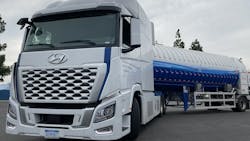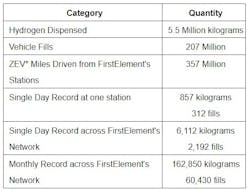FirstElement Fuel (FEF), which builds and operates hydrogen fueling stations and supply chains, is celebrating its 10th anniversary this month.
The Irvine, California-based company’s goal remains the same as in 2013: To foster the widespread adoption of fuel-cell vehicles, improve the economics of driving, reduce harmful emissions, and change the vehicle industry and the world.
“We have seen fantastic hydrogen cars and trucks brought to market by automakers since the creation of our company 10 years ago, and we see that the vehicles are ready for prime time,” Joel Ewanick, FEF CEO and founder, said in a news release. “Our job is to set up a network of stations to support the commercial rollout of these vehicles as an alternative to those powered by gasoline and diesel fuels. We are fighting every day to make that happen.
“We believe that what we are creating in California will serve as a framework that can be exported throughout the U.S. and the rest of the world, helping us achieve our mission."
Hydrogen-powered vehicles have the capacity to transform modern transportation by eliminating tailpipe emissions, slashing carbon emissions, and more than doubling driving efficiency as compared to traditional combustion vehicles, the company said. Today, FEF leads the world in retail hydrogen station design, development, and operation, serving customers with 85 retail hydrogen dispensers located throughout a network of 40 stations throughout California. FEF’s retail stations are operated under the company’s True Zero brand. The company continues to grow its California hydrogen network to serve light-duty, medium-duty, and heavy-duty vehicle classes with the support of grants from California state and regional agencies.
FEF was the first company to have demonstrated the viability of hydrogen refueling at commercial scale, meaning the ability to fill multiple cars simultaneously in under 5 minutes, 24 hours per day, seven days a week, without requiring an attendant. The company implemented its own design to develop hydrogen refueling stations that can fill four cars simultaneously and has demonstrated hydrogen refueling of multiple heavy-duty truck models at the 70 MPa standard.
FEF also is building under its True Zero brand the largest heavy-duty truck station in the world with the capability of refueling heavy-duty, medium-duty, and light-duty vehicle classes. The station is part of a public and private partnership in which Hyundai will supply 30 XCIENT Fuel Cell trucks in the largest deployment of Class 8 hydrogen-powered vehicles in the U.S. The project, titled NorCAL ZERO was jointly funded by the CEC and California Air Resources Board (CARB) and is being managed by the Center for Transportation and the Environment (CTE). FirstElement designed the station, which currently is in construction, with a unique architecture to produce a capacity of 18,000 kilograms a day and to make it the first station in the world to deploy fast-fill components and protocols capable of filling a truck with 80 kilograms of hydrogen in under 10 minutes.
“We understand there are still some headwinds facing hydrogen and cost is a significant one,” Ewanick said. “But at the same time, we have managed to keep all of our hydrogen 100% carbon free and there are imminent state and federal energy policies that will help level the cost playing field with polluting, petroleum-based fuels. We view this as merely a speedbump on the path to building the hydrogen network.
“Any company is only as good as the dedicated people that form the essence of the organization and at FirstElement our excellent team tackles each issue methodically, never becoming discouraged, and knowing we cannot stop because of what is at stake—clean air, energy security, and winning the war against climate change.”

